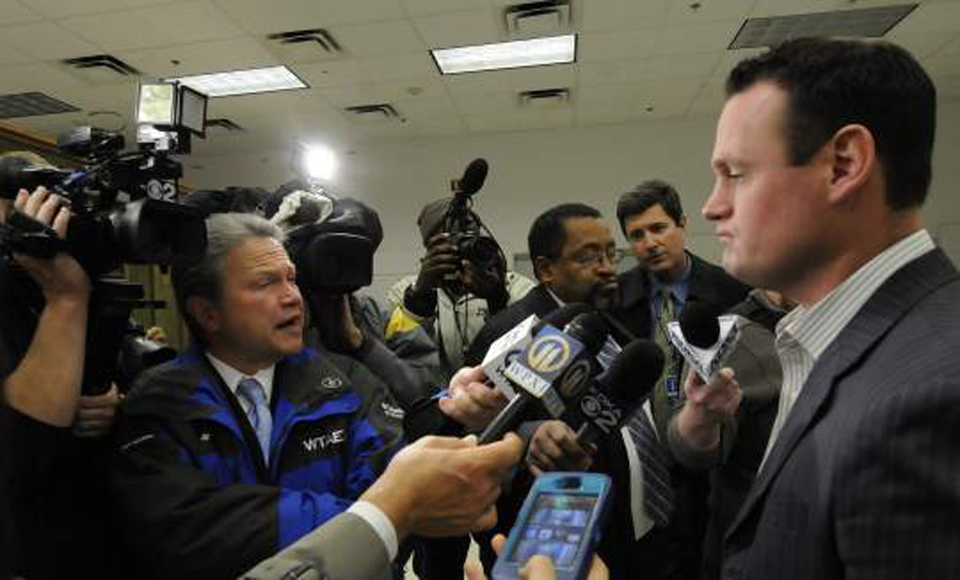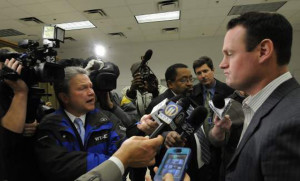

By Julian Routh | News Editor
It was not too long ago that Luke Ravenstahl was on top of the world.
As international leaders gathered in Pittsburgh for the G-20 Summit in late September 2009, the 29-year-old mayor was getting credit for putting the city on the map.
Citizens took notice, and in November, he was re-elected to serve a full four-year term.
Since then, Ravenstahl has turned from a charismatic man-of-the-people to a shut-in, avoiding public events he once proudly attended.
The fall of the Ravenstahl regime began earlier this year when it was reported that former police Chief Nate Harper was under investigation for improperly using funds. The mayor asked for Harper’s resignation in February, about a month before the former chief was indicted.
Soon after, Ravenstahl ended his campaign for re-election.
“The recent events surrounding police and the many nasty and vicious allegations that have been levied against me and those closest to me have caused me to reflect a great deal and arrive at the decision that I have,” Ravenstahl said at a press conference on March 1.
Critics of the administration remember this Luke Ravenstahl, entirely unapologetic and shameless. A federal grand jury appears to be investigating the mayor’s personal and professional life.
Former deputy mayor and Duquesne law professor Joseph Mistick said Ravenstahl “failed to provide leadership” during his time as mayor.
“Instead of inspiring the city through example and through programs, Ravenstahl’s behavior tended to do the opposite,” Mistick said. “Cities just can’t reach the heights that they otherwise could reach without bold leadership taking them there.”
NAACP Pittsburgh president Constance Parker said the relations between Ravenstahl and her organization “have not been positive.” According to Parker, the mayor did not participate in anything the NAACP was doing, and did not do enough during his tenure to address key issues.
“The unemployment rate in the African American community could not get any lower,” Parker said.
The things Ravenstahl accomplished during his seven years as mayor cannot be ignored, though.
In 2006, Ravenstahl was essential in launching the Pittsburgh Promise, a program providing scholarships and educational assistance to underprivileged youth.
Pittsburgh Promise executive director Saleem Ghubril said Ravenstahl, a co-founder of the program, gave the idea “the clout that it needed from mayoral leadership.”
“[Ravenstahl] saw the potential of the Promise and both its impact on the lives of young people and the quality of life in our neighborhoods and stood behind it,” Ghubril said.
Ravenstahl’s administration also guided the city through a developmental boom. From 2006 to 2012, the total completed, active and planned investments into developmental projects rose by nearly $3 billion, according to a Pittsburgh Downtown Partnership report.
The soon-to-be-former mayor also made strides in neighborhood advancement. Black Political Empowerment Project CEO Tim Stevens pointed to Ravenstahl’s collaboration with councilwoman Tonya Payne in 2009 to redevelop Oak Hill.
However, Stevens mentioned one area where Ravenstahl failed.
“[Ravenstahl] was never able to get the breakthrough that we needed in terms of really making a difference in the number of African Americans and people of color hired in the Pittsburgh Police department,” Stevens said.
Ravenstahl spokeswoman Marissa Doyle summarized the mayor’s tenure in an e-mail, pointing to declining crime rates, growing population and the Pittsburgh Promise as some of his finest accomplishments.
“Millions of dollars have been invested in Pittsburgh’s 90 unique neighborhoods, thousands of jobs have been created, and we continue to receive national and international accolades regularly,” Doyle wrote.
Whether he was good or bad for the city is up to debate, but one thing isn’t.
Luke Ravenstahl is no longer Pittsburgh’s young star.



